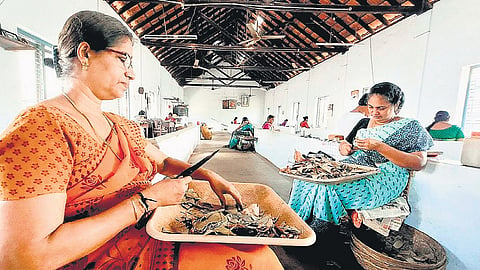

KANNUR: The Dinesh Beedi Workers’ Cooperative Society, a landmark institution born from a labour movement in 1969, is now teetering on the edge of extinction.
As part of its survival strategy, the Pappinissery and third-level branches of the society have been merged with the Chirakkal branch. Also, the office-bearers have decided to consolidate other primary branches, including those in Azhikode and Kannur, to function as a single entity in a bid to sustain operations.
At its peak, Dinesh Beedi provided employment to around 42,000 workers across the Kannur and Kasaragod districts. Today, only 2,001 workers remain. There are 16 Dinesh beedi branches under which 82 small scale units exist, each having an average of 20 workers. Until now, the Pappinissery and Azhikode branches were operating under the Azhikode Dinesh Beedi Industrial Cooperative Centre.
The Pappinissery branch launched operations in its own building on May 1, 1985, with around 130 workers. Then MLA E P Jayarajan inaugurated the branch. Following the latest closure, 21 workers from Pappinissery and 16 from neighbouring units will now be absorbed into the Chirakkal branch.
The Karikkamkulam branch, which opened in a rented building on January 3, 1975, with 150 workers, was closed nearly a decade ago. Several other branches, including one in Kannur town, have also downed shutters.
“I joined Dinesh Beedi when I was 18. For the past 36 years, I have spent my days making beedis,” said Savithri P V, a beedi worker.
“All of us are around the same age now. There were once 40,000 workers in these units. Today, there are 2,001. It was once considered as good as a government job. We married off our children like proud government employees. Things have changed,” said Savithri. Growing awareness about the health risks of tobacco, combined with strict anti-smoking laws and public health campaigns, triggered a sharp decline in beedi consumption since the 1990s.
Kerala Dinesh Beedi (KDB) also faced stiff competition from low-cost beedis produced in states like West Bengal and Tamil Nadu, where production costs are substantially lower. While KDB pays around Rs 500 for every 1,000 beedis rolled, competitors pay as little as Rs 75, enabling them to undercut prices. The pandemic worsened the industry’s situation.
To counter these challenges, KDB diversified into sectors such as food processing, umbrella manufacturing, information technology and apparel, but the ventures have struggled to match the scale and profitability of the beedi business.
“Though the beedi business is running at a loss, we cannot let the workers suffer. We have ensured that existing workers can continue in their roles until they retire. However, we cannot appoint new people in the beedi sector,” Kerala Dinesh chairman Dinesh Babu told TNIE.
“Diversification was the only way to support our people. As the industry declined, many beedi workers moved to other ventures under Kerala Dinesh, such as umbrella manufacturing and Dinesh Cafe,” he said.
Dwindling fortunes
At its peak, Dinesh Beedi provided employment to around 42,000 workers across the Kannur and Kasaragod districts. Today, only 2,001 workers remain
Growing awareness about the health risks of tobacco has triggered a sharp decline in beedi consumption since the 1990s
KDB also faces stiff competition from low-cost beedis produced in states like West Bengal and Tamil Nadu